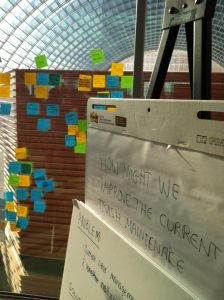Gum. Plastic bags. Tipped over. People don’t want to touch trashcan handles.
Those were some of the dozens of observations about trash and litter in Philadelphia that were handwritten on colorful sticky notes hanging on the windows of the rooftop Hamilton Garden at the Kimmel Center for the Performing Arts.
During the 2014 Fox Design Challenge, more than 175 students addressed litter abatement in partnership with the Mayor’s Office of New Urban Mechanics and Keep Philadelphia Beautiful.
Thanks to an outpouring of participation, the Kimmel Center hosted the fourth annual Temple University Fox School of Business Design Challenge, held in previous years in Alter Hall. The innovative idea competition challenges students from across the region to combine business and design concepts in creating pioneering solutions to urban issues.
This year’s challenge, with the theme Talking Trash, attracted 175 students who worked in 20 teams to address litter abatement in partnership with the Mayor’s Office of New Urban Mechanics and Keep Philadelphia Beautiful.
The first half of the competition kicked off Feb. 14, when students met with one another and heard from varying experts from city agencies, nonprofits and community groups, who gave students insight on how to approach this year’s challenge. Students then spent the weekend participating in walking tours of the city to experience the problem firsthand.
On Feb. 18, interdisciplinary student teams spent the day brainstorming, prototyping and presenting their solutions as they overlooked South Broad Street from the Kimmel Center.

Students’ observations about trash and litter in Philadelphia were handwritten on colorful sticky notes and posted on the windows of the rooftop Hamilton Garden at the Kimmel Center for the Performing Arts.
Among the more than 175 registered students, eight of Temple’s schools and colleges were represented, as were five universities (in addition to Temple, University of the Arts, Philadelphia University, the University of Pennsylvania and SUNY Institute of Technology) and five local high schools (Crossroads Accelerated Academy, Mastery Charter Schools, Welsh Valley Middle School, George Washington Carver and SCH Academy).
The four finalist teams approached litter abatement with variations on a theme: using technology, such as mobile apps and social networks, and competition and rewards systems to make a game of beautifying the city.
The winning team – which took home $1,000 and Justinmind prototyping software – pitched Waste Wars, an app, game, and data-collection tool. Points and vouchers to local businesses would be awarded to participants who take photos or videos of themselves picking up and throwing away trash.
Meanwhile, with location data from the app, city officials could see which neighborhoods have the heaviest user base and, therefore, the most need for services.

The Design Challenge, an innovative idea competition, featured 20 interdisciplinary student teams from across the region.
“This year we had the biggest and most diverse group of students, and you could see that in the quality of the presentations,” said James Moustafellos, assistant professor of management information systems (MIS), associate director of the Temple Center for Design and Innovation and lead planner of the event. “We have a lot of minds working together to solve complex problems.”
That diversity was illustrated in the Waste Wars team members: Cory Hurlbut, junior business administration major at SUNY-IT; Jordan Shade, second-year Master of Design student at the University of the Arts; Olivia Schmid, first-year Global MBA student at the Fox School; Annie Buckley, junior MIS major; Cori Shearer, senior MIS and strategic communication double major; Jimik Ligon, sophomore at Simon Gratz High School (in the Mastery system); and Tanner Panetta, sophomore graphic and interactive design major at Temple’s Tyler School of Art.
“We’ll be looking for ways to use the ideas developed throughout the competition as we work to reduce the amount of litter on our streets,” Keep Philadelphia Beautiful wrote in a blog post. “We’ll also be working to keep the students involved in this year’s challenge engaged; having close to 200 smart and trained individuals thinking about the litter problem is no small feat, and we want to keep them involved as we continue our work and outreach.”

